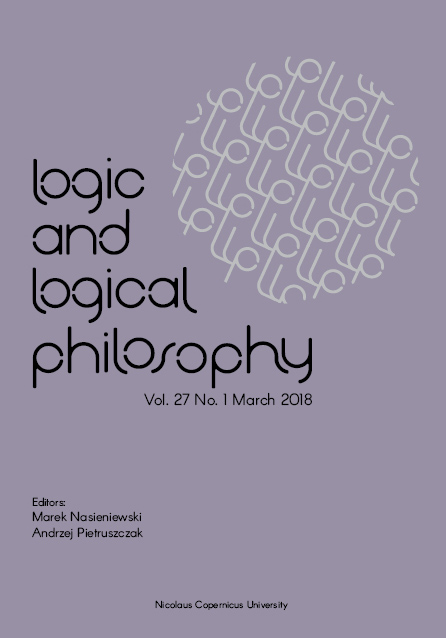Epistemological Naturalness: What is a good heuristic strategy good for?
DOI:
https://doi.org/10.12775/LLP.2017.003Keywords
David Lewis, eligibility, meaning, metasemantics, naturalness, propertiesAbstract
According to the standard interpretation of Lewis’s theory of predicate meaning (the U&N theory), the naturalness of meaning candidates should be stated metaphysically as a length of definition in terms of fundamental properties. Recently, Weatherson has criticized the U&N theory and argued that the criterion of naturalness should be stated epistemologically as the amount of evidence needed to form a belief. Despite the criticism, his attitude towards the U&N theory is quite relaxed. According to Weatherson, the U&N theory can be used as a good heuristic for delivering the correct verdicts when doing applied semantics, i.e., when we try to determine the best meaning candidate for a particular predicate.
In this paper, I try to show that the “good heuristic strategy” is of no use because A) there is no guarantee that the epistemological and the metaphysical criteria of naturalness deliver the same verdicts and B) even if they deliver the same verdicts, the difference in their theoretical backgrounds may affect arguments which rely on the verdicts. The difference will be shown by drawing on the example of Theodore Sider and his use of the U&N theory.
References
Carnap, R., “Empiricism, semantics and ontology”, Revue Internationale de Philosophie, 4, 2 (1950): 20–40.
Cziko, G., Without Miracles: Universal Selection Theory and the Second Darwinian Revolution, Cambridge MA, MIT Press, 1995.
Derksen, A., “Evolutionary epistemology in defense of the reliability of our everyday perceptual knowledge: A promise of evolutionary epistemology”, Philosophia-Naturalis, 38, 2 (2001): 245–270.
Goodman, N., Fact, Fiction and Forecast, Cambridge, Harvard University Press, 1955. Cited from: fourth edition, Cambridge, Harvard University Press, 1983.
Hirsch, E., “Language, ontology, and structure”, Noûs, 42, 3 (2008): 509–528. DOI: 10.1111/j.1468-0068.2008.00689.x
Hirsch, E., Quantifier Variance and Realism: Essays in Metaontology, New York, Oxford University Press, 2011.
Kripke, S., Wittgenstein on Rules and Private Language, Cambridge, Harvard University Press, 1982.
Lewis, D., Convention: A Philosophical Study, Cambridge, Harvard University Press, 1969.
Lewis, D., “Radical interpretation”, Synthese, 27, 3–4 (1974): 331–344. DOI: 10.1007/BF00484599
Lewis, D., “Languages and language”, pages 3–35 in K. Gunderson (ed.), Language, Mind, and Knowledge, Minneapolis, University of Minnesota Press, 1975.
Lewis, D., “New Work for a Theory of Universals”, Australasian Journal of Philosophy, 61, 4 (1983): 343–377. DOI: 10.1080/00048408312341131
Lewis, D., “Putnam’s Paradox”, Australasian Journal of Philosophy, 62, 3 (1984): 221–236. DOI: 10.1080/00048408412340013
Lewis. D., “Mad Pain and Martian Pain”, pages 216–232 in N. Block (ed.), Readings in the Philosophy of Psychology, Cambridge, Harvard University Press, 1980.
Lewis, D., “Meaning without use: Reply to Hawthorne”, Australasian Journal of Philosophy, 70, 1 (1992): 106–110. DOI: 10.1080/00048408112340093
Lewis, D., “Reduction of mind”, 412–431 in: S. Guttenplan (ed.), A Companion to the Philosophy of Mind, Oxford, Blackwell, 1994.
Popper, K., “Evolutionary Epistemology”, in J.W. Pollard (ed.), Evolutionary Theory: Paths into the Future, London, John Wiley & Sons Ltd, 1984.
Putnam, H., Reason, Truth, and History, Cambridge, Cambridge University Press, 1981.
Quine, W., Word and Object, Cambridge, MIT Press, 1960.
Schwarz, W., “Against Magnetism”, Australasian Journal of Philosophy, 92, 1 (2014): 17–36. DOI: 10.1080/00048402.2013.765900
Sider, T., “Criteria of personal identity and the limits of conceptual analysis”, Philosophical Perspectives, 15, 1 (2001): 189–209. DOI: 10.1111/0029-4624.35.s15.10
Sider, T., Four-Dimensionalism, Oxford, Oxford University Press, 2001.
Sider, T., “Ontological Realism”, pages 384–423 in D. Chalmers, D. Manley, and R. Wasserman (eds.), Metametaphysics, Oxford, Oxford University Press, 2009.
Sider, T., “Sparseness, immanence, and naturalness”, Noûs, 29, 3 (1995): 360–377. DOI: 10.2307/2215604
Sider, T., Writing the Book of the World, Oxford, Oxford University Press, 2011.
Sperber, D., Wilson, D., Relevance: Communication and Cognition, Second Edition, Oxford/Cambridge, Blackwell Publishers, 1995.
Stalnaker, R., “Lewis on intentionality”, Australasian Journal of Philosophy, 82, 1 (2004): 199–212. DOI: 10.1080/713659796
Stich, S., The Fragmentation of Reason: Preface to a Pragmatic Theory of Cognitive Evaluation, Cambridge MA, MIT Press, 1990.
Weatherson, B., “What Good are Counterexamples?”, Philosophical Studies, 115, 1 (2003): 1–31. DOI: 10.1023/A:1024961917413
Weatherson, B., “The role of naturalness in Lewis’s theory of meaning”, Journal for the History of Analytic Philosophy, 1, 1 (2013): 1–19. DOI: 10.4148/jhap.v1i10.1620
Williams, J.R.G., “Eligibility and inscrutability”, Philosophical Review, 116, 3 (2007): 361–399. DOI: 10.1215/00318108-2007-002
Williams, J.R.G., “Lewis on reference and eligibility”, pages 367–381 in B. Loewer and J. Schaffer (eds.), A Companion to David Lewis, Oxford, Wiley-Blackwell, 2015.
Wittgenstein, L., Philosophical Investigations, Oxford, Blackwell, 1953.
Downloads
Published
How to Cite
Issue
Section
Stats
Number of views and downloads: 691
Number of citations: 1







